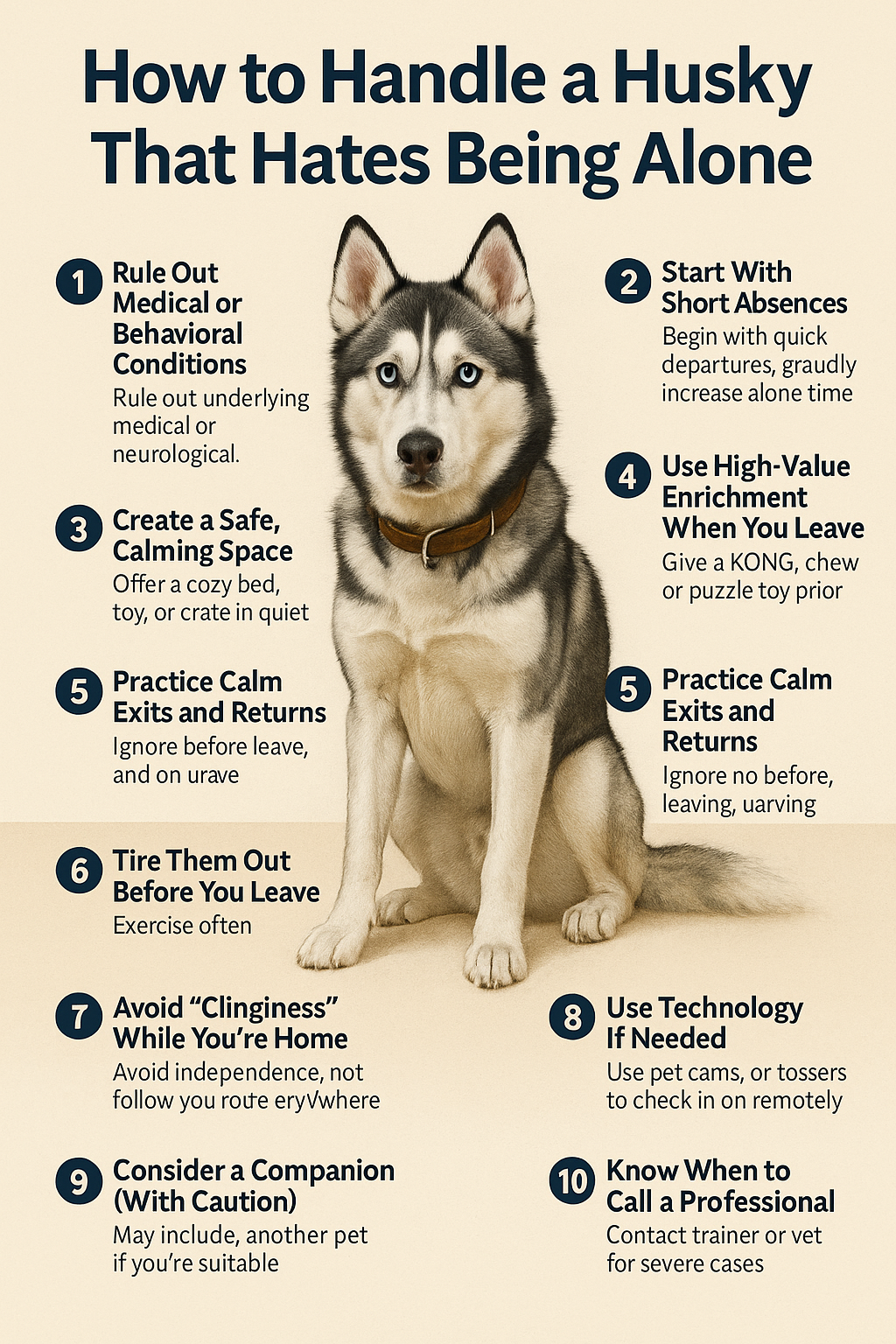Siberian Huskies have pretty strong pack instincts. They are known to never be alone in the wild– and well, they don’t much like it alone at your house either. A bunch of huskies, suffer from seperation anxiety or cannot tollerate being left alone for any long stretch of time. This leads to howling, chewing up the place, diggin’, or tryin’ to bolt out!
If your Husky starts feeling anxious, get’s destructive or distressed the second you head out, you ain’t the only one–nor are they all by their lonely selfs.
This guide explores why Huskies have issues being left alone, we’ll help you help your dog feel calm and secure when you have solo time!
Why Huskies Hate Being Alone
Huskies really are incredibly social animals. The need for companions is, um, it’s not just emotional–its instinctual! They been bred to work together in teams, right, like close knit sled teams, and really do bond with their human families!
Left alone this triggers stuff, like:
Separation anxiety
Boredom equals destruction.
Vocalization to get the “pack” back
Escape, digging, or door scratching
This ain’t about bein’ disobedient. This about fear, feeling confused, and needing help.
Alright, here’s that content, jazzed up a bit with those tweaks you asked for
Step 1: Rule Out Medical or Behavioral Conditions
Hold up before you fix anxiety via training– ya gotta rule out anything physical or behaviorally funky. If your Husky’s acting off suddenly, a vet check should be the first stop, always.
When your doggo gets a clean bill of health from the doc, then you can get to work on tweaking that behavior.
Step 2: Start With Short Absences
If your Husky gets frantic when you leave, don’t just bounce for a whole workday. Start small and help em feel comfy during very short stretches of you not being there.
Try this easy peasy setup:
Exit the room for just half a minute, that is.
Come back in all chill– no over-the-top celebrations.
Slowly, step by step, add more time away.
Mix it up so your Husky ain’t expecting the same routine.
Do this every day, keeping it under your dog’s freak-out level, eh? They’ll grow a little tougher and, ya know, their tolerance gets better with each try.
Step 3: Create a Safe, Calming Space
Hook your Husky up with a chill “alone zone” that’s reassuring– not some punishment thing.
This can feature:
A comfy crate– if they’re crate-trained, that is.
A playpen or small room.
Their absolute favorite blanky or dog bed.
A toy smelling just like you!
Mellow background music or some white noise.
Never use this zone like a timeout, understand? It’s meant to be a safe spot they choose not someplace they get shoved into.
Step 4: Leverage Sweet Departure Enrichment!
Make leaving pleasant you get me. Shower your Husky with delights exclusive to your absence, like:
A peanut butter stuffed KONG thats frozen, obviously
A toy that dispenses treats, a puzzle of sorts
A chew-toy that endures, watched of course
Snuffle mat, secrets and snack
See, it reframes the leaving as something great is brewing.
Step 5: Gentle Exits and Arrivals
If you turn comings or goings in drama your dog’s do the same.
Try this, alright:
Leave ignoring the pooch 10 to 15 minutes before leaving
Just walk away quietly, don’t say any goodbyes
Once back wait until he’s chilled out a bit
This stops all the emotion spikes it does and tells them comings and goings ain’t no thing.
Step 6: Exhaus’ ‘Em Before Ya Bolt
A tired Husky, its a relaxed Husky. Before your exit give em:
A brisk 30-45 minute walk, perhaps a jog too
Training, short, simple, puzzle games works
Tug-of-war or even a fetch game.
Burning energy bright an early reduces that antsy, later anxiety.
Step 7: Don’t be a shadow when home, yeah?
When that Husky tails, room-to-room practice a lil bit independence there you go
Shut the bathroom door, yeah
Promote their settle in their area, please.
Give a reward for holding their spot, unprompted.
Teaching self-assurance it starts right away, even when you are around, like that
Step 8: Use Tech if you must
Pet tech assist fill gaps while away.
Like a Pet cameras to see behavior and speak your dog
Those treat-throwing gadgets are handy as Furbo
Like Auto feeders, puzzles with timed drops
These tools, they can keep your dog busy plus bring you peace.
Step 9: Think of another pup, but cautiously
Some Huskies, well, do better with others, some no. If ya thinkin’ a new pet:
Make sure your current one’s stable, you know?
Introduce real slow, get some professional help.
Two dogs means double commitment, alright?
A dog pal, they sometimes fix lonely, yes, Sometimes more problems. Choose well, do.
Step 10: Knowing to Call Expert
If Husky’s anxiety is a big deal such as destructive actions, talking non stop or like, hurting themself you gotta hire a trainer, behaviorist, yup.
Pros can help:
Develop a specific training plan
Find deeper things.
Give anxiety meds if need (only last resort).
Do not wait till issues get worse, see. Early intervention? Cuts stress, alright.
Final Thoughts: Solitude, A Skill, Not a Consequence
Training a Husky for lone moments, isn’t just about pushing independence; it’s crafting trust. When your dog knows you will return, an’ that treats arrive when your absence is felt, they can find tranquility.
It demands effort. It requests patience, oh yes. But with routine, planning, and love, your Husky can see, loneliness isn’t frightful; it’s simply another chapter of each day.
And then they finally, are napping peacefully while yer’ away? Well, thats a victory for all of ya!
